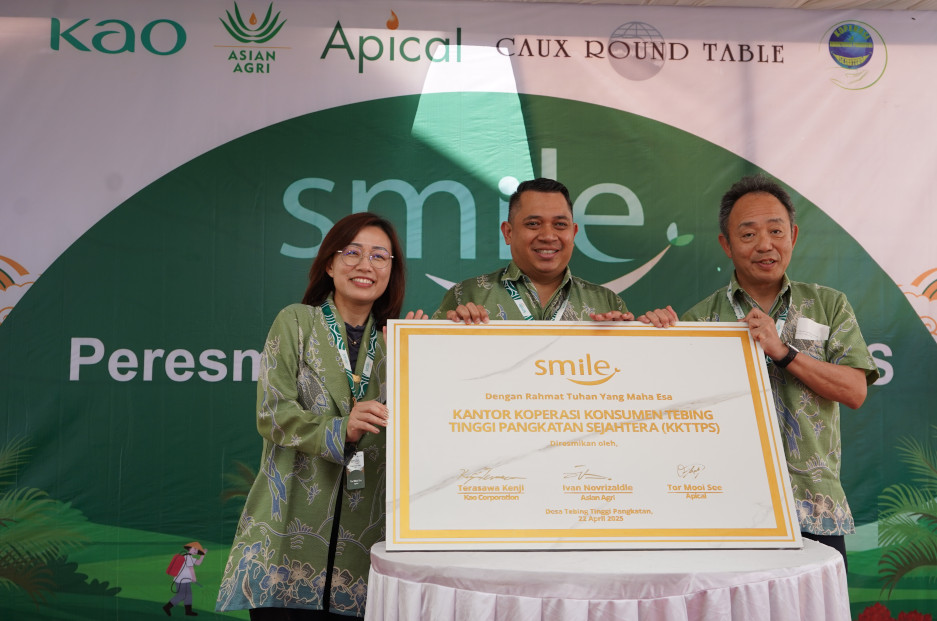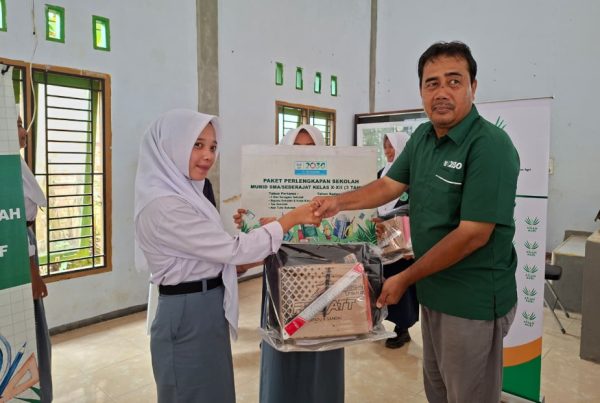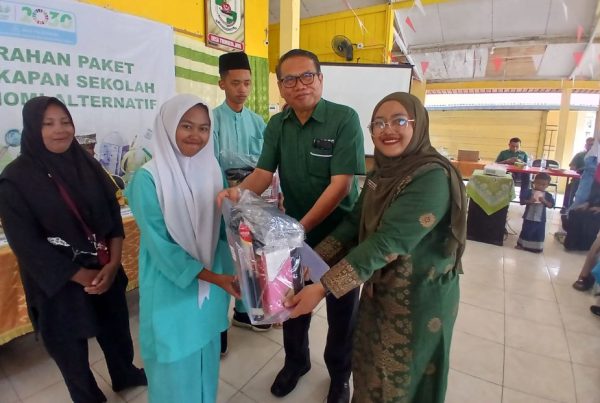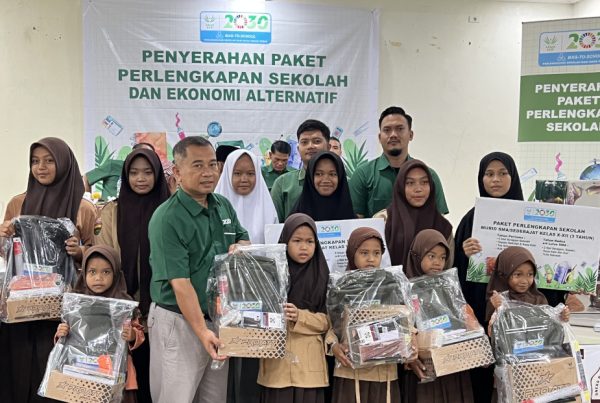Rantauprapat, 22 April 2025 – Asian Agri, Apical, and Kao have strengthened the implementation of the SMILE (SMallholder Inclusion for Better Livelihood and Empowerment) program, which has been running since 2020. A field visit was conducted on April 21–22 in Rantauprapat, North Sumatra, involving monitoring and evaluation of independent smallholder farming practices, field inspections, and ideation sessions. The outcomes of this visit will serve as a foundation for improving future program support.
Executives and company representatives began their visit at the Aek Nabara palm oil mill, operated by PT Supra Matra Abadi, one of the companies in Asian Agri. The mill plays a key role in the SMILE program by processing fresh fruit bunches (FFB) and acting as an intermediary in the supply chain, connecting participating independent smallholders with Kao.
“At Kao, we believe in the Genba philosophy—going directly to the field to fully understand the situation. It’s important for us to witness first-hand how palm oil is produced. As a key raw material in our business, palm oil is strategic. We see Asian Agri and Apical as key partners. This visit reflects our shared commitment to achieving better outcomes,” said Kenji Terasawa, Vice President of Procurement of Kao Corporation.
As part of the visit, the team reviewed traceability and sustainable practices the mill. A discussion was held to explore the challenges smallholders face in meeting certification standards, while also identifying ways to strengthen technical support, partnerships, and the design of the program’s next phase.
Tor Mooi See, Head of Sustainability at Apical Group, said the visit was important to evaluate the SMILE program and shape its next steps. “As we design the next phase of SMILE, our focus is on expanding the impact we’ve achieved. That means building stronger connections between mills and smallholders, providing continuous support, and ensuring our supply chain remains inclusive and responsible from upstream to consumers,” she said.
On the second day, the three companies inaugurated a new office for village cooperative in Labuhanbatu Regency. The building was funded by premium payments from selling FFBs through the SMILE program. It stands as a symbol of the smallholders’ hard work and the power of collaboration in promoting independence and sustainability.
The inauguration ceremony was attended by more than 100 smallholders and invitees, opened with a traditional Batak tor-tor dance, followed by the ulos cloth being draped over representatives from Asian Agri, Apical, and Kao—a customary Batak gesture of respect. The ceremony continued with a ribbon cutting, tumpeng (rice cone) slicing, and a plaque signing to officially open the cooperative building.
“This new office is more than just a building. It represents years of hard work under the SMILE program. It will serve as a hub for cooperative activities, a place where we gather, learn, and continue to grow together,” said Khairul Anam, Head of Cooperative.
The smallholders expressed appreciation for the program, which they said has gradually transformed the way they manage their farms. They noted the support helped them understand the importance of recordkeeping, structured agricultural practices, and the process toward certification standards.
“SMILE isn’t just about support. It gives us the confidence that we can be part of a sustainable and transparent global supply chain,” Khairul added.
Ivan Novrizaldie, Head of Sustainability at Asian Agri, said the collaboration between Asian Agri, Apical, and Kao has led to meaningful results. “The SMILE program shows that with technical assistance, capacity building, and institutional support, smallholders can grow economically, socially, and environmentally. This cooperative building is tangible proof of that progress,” he said.
Through the NPO Caux Round Table (CRT), Kao also introduced Suara Petani, a grievance mechanism that serves as an official channel for smallholders to voice their aspirations, suggestions, and complaints. This platform strengthens structured and actionable communication, reinforcing accountability and transparency on the ground.
An interactive session with smallholders was also held to gather their input on the program. Smallholders shared testimonials about how their agricultural practices have improved, leading to better yields and stronger household economic resilience.
As part of its commitment to community welfare, Kao representatives visited SDN 03 Tebing Tinggi Pangkatan to educate students on the importance of handwashing with soap. “We believe that caring—for ourselves, others, and the environment—is the foundation of true well-being. Through this initiative, we want to highlight that hand hygiene is not only about health, but also about protecting our families and boosting self-confidence,” said Kenji Terasawa.
The SMILE program is part of the long-term commitment by Asian Agri, Apical, and Kao to promote a more inclusive and responsible palm oil supply chain. It aligns with the first pillar of Asian Agri 2030, Smallholder Partnership, and the fourth pillar of Apical 2030, Inclusive Growth.
To date, SMILE has engaged 3,489 independent smallholders, 1,373 of whom have achieved RSPO certification. The program supports Asian Agri’s goal of partnering with 5,000 certified smallholders by 2030.
About Asian Agri
Founded in 1979, Asian Agri is one of Indonesia’s foremost companies in crude palm oil production, managing over 100,000 hectares of oil palm plantations and employing over 20,000 people.
As a pioneer of the Indonesian Government’s Smallholder Transmigration Core Plantation Programme (PIR-Trans), Asian Agri has partnered with 30,000 scheme smallholders in Riau and Jambi, who collectively manage 60,000 hectares of oil palm plantations. The company also fosters partnerships with independent smallholders to enhance their welfare and drive socio-economic growth.
Committed to sustainable practices, Asian Agri upholds a zero-burning policy and implements plantation best management practices to help smallholders boost productivity, increase crop yields, and improve supply chain traceability while supporting their journey towards certification. Asian Agri’s mills leveraged advanced technology and self-generated green energy to minimize greenhouse gas emissions.
Asian Agri’s plantations, as along with their scheme smallholder plantations, are full Roundtable on Sustainable Palm Oil (RSPO) and International Sustainability & Carbon Certification (ISCC) certified, underscoring the company’s commitment to responsible and sustainable palm oil production.
Please visit Asian Agri’s website for more information and media inquiries may be directed to:
Corporate Communication, Asian Agri
E-mail: communications@asianagri.com
About Apical
Apical is a leading vegetable oil processor with an expanding global footprint. Our vertically integrated mid-stream refining and value-added downstream processing makes us an integral supplier that supports the needs of various industries namely food, feed, oleochemicals and renewable fuel, including sustainable aviation fuel (SAF) which enables a great reduction of CO2 emissions.
With integrated assets in strategic locations spanning Indonesia, China and Spain, Apical operates numerous refineries, oleochemical plants, renewable fuel plants and kernel crushing plants. Through joint ventures and strategic partnerships, Apical also has processing and distribution operations in Brazil, India, Pakistan, Philippines, Middle East, Africa, USA and Vietnam.
Apical’s growth is built on the foundations of sustainability and transparency, and motivated by our strong belief that we can contribute to a circular economy for a more meaningful impact, even as we continue to grow our business and deliver innovative solutions to our customers.
For more information, please visit www.apicalgroup.com.
Media Contact:
Corporate Communications, Apical Group
Email: corpcomm@apicalgroup.com





